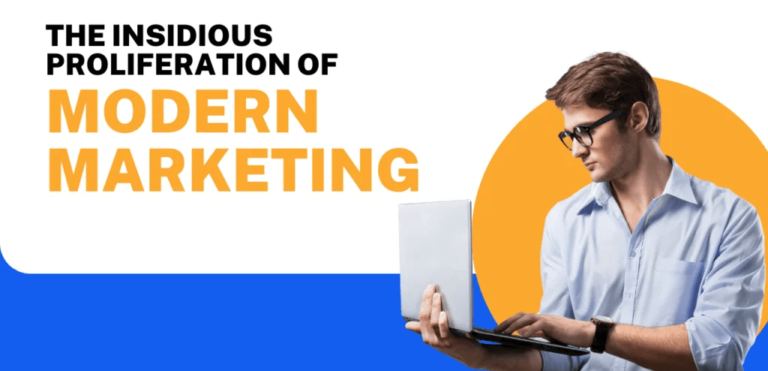Introduction
In today’s digital age, marketing has evolved into a complex and omnipresent force. The insidious proliferation of modern marketing affects every aspect of our lives. This article delves into the mechanisms behind this phenomenon, its impact on consumers, and strategies for navigating the marketing landscape. By understanding modern marketing, we can better engage with it responsibly.
Understanding the Insidious Proliferation of Modern Marketing
Modern marketing is pervasive. It uses data, technology, and psychology to influence consumer behavior. Marketers analyze vast amounts of data to craft personalized messages that resonate with target audiences. This approach makes marketing campaigns more effective but also more intrusive.
The Role of Data in Modern Marketing
Data is the backbone of modern marketing. Companies collect data from various sources, including social media, browsing history, and purchase records. This data helps marketers understand consumer preferences, behaviors, and trends. It allows for hyper-targeted advertising, ensuring that the right message reaches the right person at the right time.
Case Studies Highlighting Modern Marketing Techniques
Several case studies highlight the effectiveness of modern marketing techniques. For example, Netflix uses data analytics to recommend content based on user preferences. Amazon employs personalized marketing to suggest products. These companies leverage data to create a seamless and engaging user experience.
The Channels of Modern Marketing
Modern marketing utilizes various channels to reach consumers. These channels include social media, search engines, and influencers. Each channel has unique strengths and can be used to achieve different marketing objectives.
The Mechanics of Modern Marketing
The mechanics of modern marketing involve a blend of creativity and technology. Marketers use tools like SEO, PPC, and content marketing to attract and engage audiences. They also rely on automation to streamline processes and improve efficiency.
The Insidious Proliferation of Modern Marketing
Social Media Platforms
Social media platforms are central to modern marketing. They offer a direct line of communication between brands and consumers. Marketers use these platforms to build brand awareness, engage with audiences, and drive sales. The data collected from social media interactions further refines marketing strategies.
Search Engine Marketing
Search engine marketing (SEM) is another crucial component. It involves optimizing content to rank higher in search results and using paid advertising to increase visibility. SEM ensures that consumers find relevant products and services when searching online.
Influencer Marketing
Influencer marketing leverages the reach and credibility of social media influencers. Brands partner with influencers to promote products authentically. This method is effective because consumers trust influencers’ recommendations more than traditional advertisements.
The Impact on Consumers
The insidious nature of modern marketing has significant impacts on consumers. On one hand, personalized marketing provides relevant content and offers. On the other hand, it raises privacy concerns and can lead to information overload. Consumers must navigate this landscape carefully to protect their privacy and make informed decisions.
Navigating the Modern Marketing Landscape
For Consumers
Consumers can take several steps to navigate modern marketing effectively. First, they should be aware of data collection practices and privacy policies. Using ad blockers and privacy-focused tools can limit unwanted exposure. Additionally, consumers should critically evaluate marketing messages and seek out unbiased reviews.
For Businesses
Businesses must balance effective marketing with ethical considerations. They should prioritize transparency in data collection and use. Building trust with consumers is essential for long-term success. By focusing on providing value and respecting privacy, businesses can create positive and lasting relationships with their audience.
The Future of Modern Marketing
The future of modern marketing will likely see further advancements in technology and data analytics. AI and machine learning will play a more significant role in predicting consumer behavior and personalizing marketing efforts. However, ethical considerations will become increasingly important as consumers demand greater transparency and control over their data.
Table: Ethical Considerations in Modern Marketing
| Ethical Consideration | Description |
|---|---|
| Transparency | Clearly communicate data collection practices. |
| Consent | Obtain explicit consent for data usage. |
| Privacy | Protect consumer data and ensure its security. |
| Relevance | Provide value through relevant and useful content. |
| Accountability | Hold businesses accountable for ethical marketing practices. |
Conclusion
The insidious proliferation of modern marketing has transformed the way businesses and consumers interact. By understanding the mechanisms behind modern marketing, we can navigate this landscape more effectively. Businesses should prioritize ethical considerations to build trust and long-term success. As consumers, staying informed and vigilant can help us make better decisions in an increasingly marketing-driven world.
By considering these insights and strategies, you can better engage with modern marketing and its pervasive influence. Stay informed, stay vigilant, and make the most of the opportunities that modern marketing offers.
